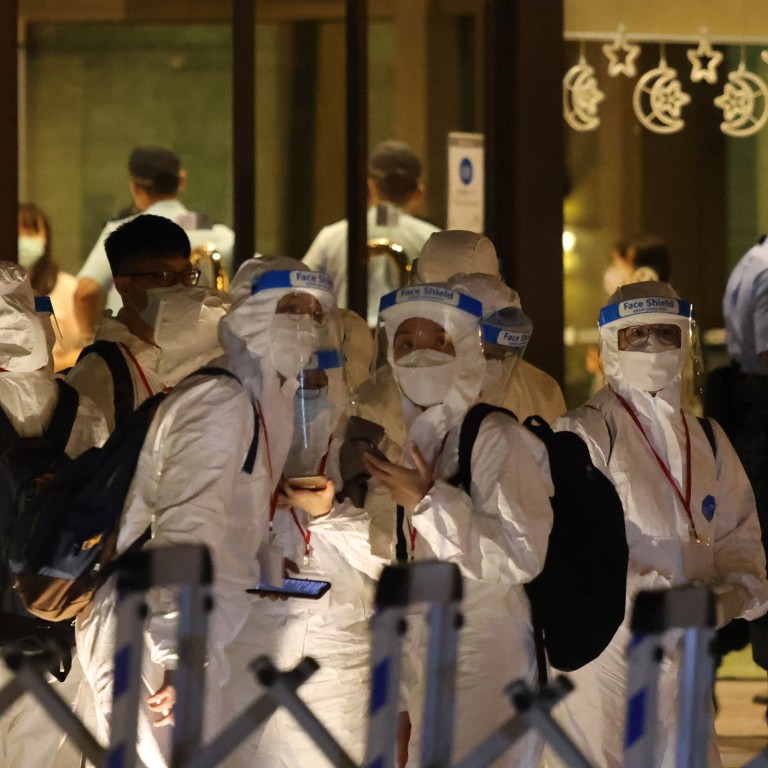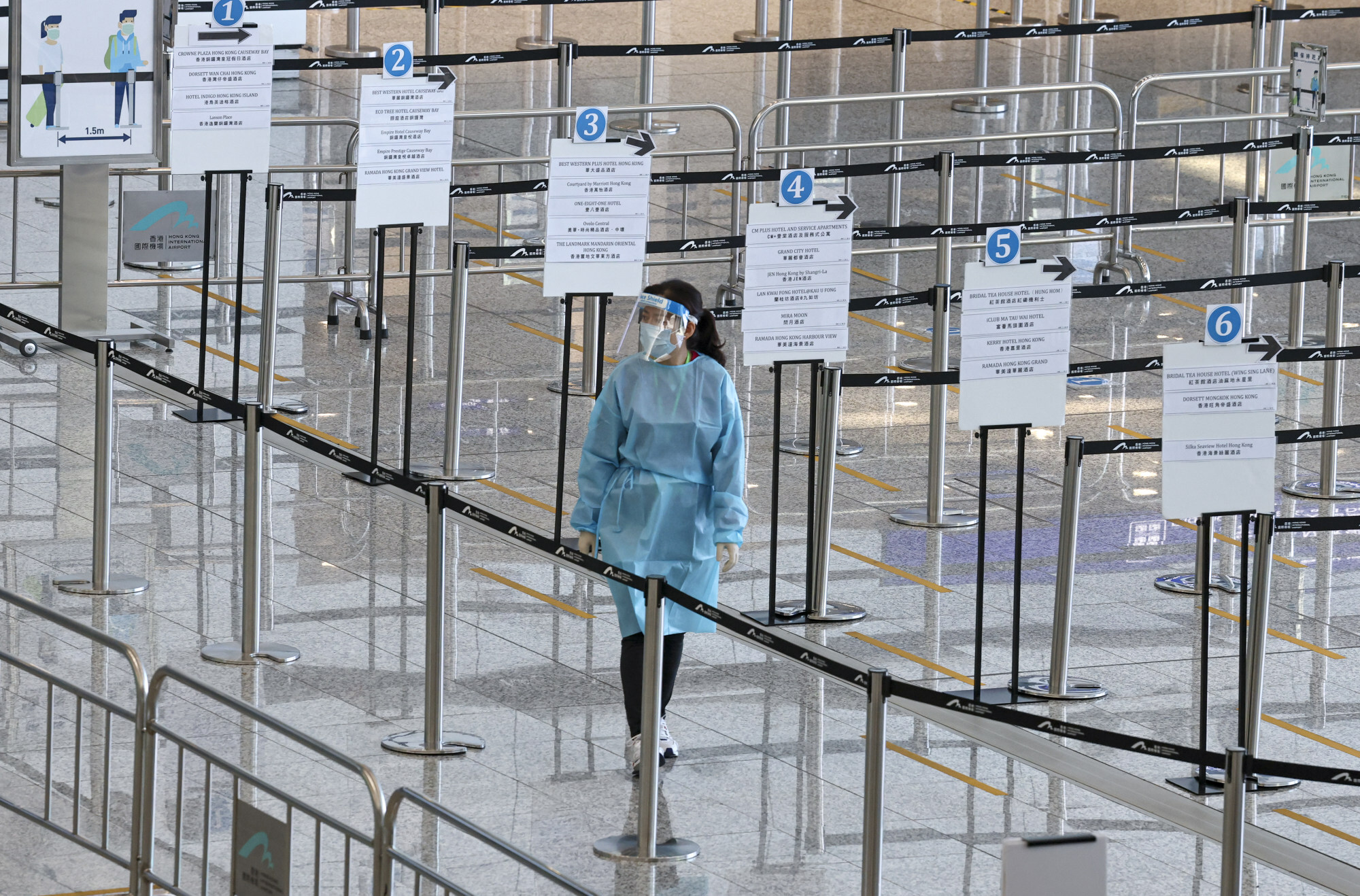
Omicron shows Hong Kong can’t maintain ‘dynamic zero-Covid’. It’s time to learn to live with Covid-19 and open up to the world
- Strict virus curbs make little economic sense if the mainland border shows no signs of reopening and the city’s current outbreak spirals further out of control
- Authorities should emphasise that not being vaccinated – as many of the city’s elderly residents continue to be – is unacceptable, antisocial behaviour
A persistent failure to suppress the current outbreak could leave Hong Kong facing more stringent measures with no end in sight, even as the authorities refuse to contemplate a more sustainable, business-friendly mitigation approach.
It is time for the Hong Kong government to accept the possibility that even if zero-Covid is a desirable goal, it is not realistic or achievable. Alternative strategies for dealing with the virus must now be considered.

The government argues that it has to persist with “dynamic zero-Covid” – accepting that infections will happen but then moving quickly to stamp them out – because most of the city’s elderly residents are unvaccinated and therefore vulnerable. Just half of those in their 70s and only one-fifth of residents in their 80s have been double jabbed so far.
Under the current strategy, social distancing measures can only be relaxed once vaccination rates among the elderly are sufficiently high – say 80 per cent. But this line of reasoning, and the case for dynamic zero-Covid, is flawed on at least four levels.
Costly, impractical
Omicron is more transmissible partly because it causes less severe illness, especially in vaccinated people – making them more likely to ignore the mild symptoms and spread the virus without knowing it, as they go about their normal routines despite being contagious.
In a highly vaccinated population, it is almost a foregone conclusion that the official number of confirmed cases will be a significant underestimate. This is compounded in Hong Kong, where the fear of being sent to hospital or to quarantine at Penny’s Bay far exceeds the fear of Covid-19. Almost every vaccinated person I have spoken to said they would isolate themselves if they had symptoms, rather than subject themselves to tests administered by the authorities.
This makes voluntary testing, even if it is done on a large scale, much less useful in detecting infections. It also makes zero-Covid an increasingly elusive goal for Hong Kong as vaccinations rise in the face of the highly transmissible but less severe Omicron variant.
Ethically, economically flawed
Third, the argument that a highly vaccinated population should have to upend their lives and put their livelihoods at risk to protect elderly residents who refuse to get jabbed is ethically flawed. Safe and highly effective vaccines have been widely available for over a year now and the elderly have had ample opportunities to get themselves protected against severe illness.
To foster such norms, the government should emphasise that – absent a valid medical exemption – not being vaccinated is unacceptable, antisocial behaviour. Rather than ask a mostly vaccinated society to accept further sacrifices, the authorities should prioritise the vaccinated over the unvaccinated. They could, for instance, make vaccination status part of the triage procedure when admitting patients to hospital – especially if Hong Kong’s health care system is inundated with Covid-19 patients and its hospital resources are stretched.

Reopening to the mainland would have been preferable for a city that is more dependent on China’s economy than any other, but faced with the reality of a perpetually closed border the second best alternative for Hong Kong is to reopen to the rest of the world and adapt to living with the virus. The city’s government can still pursue reopening with the mainland as and when the authorities there are ready to adapt to a world where Covid-19 has become endemic.
Opening up to the world does not have to mean abandoning all restrictions, nor passively accepting higher numbers of hospitalisations and deaths. In fact, living with Covid-19 requires a competent, activist government that constantly calibrates and fine-tunes the balance between containment measures and letting people get on with their normal lives. It does not have to be viewed as surrendering to the enemy.
Getting Covid in Singapore: after 6 days in home isolation, I was free to leave
The choice between containment and mitigation is also not a binary one. Singapore, for example, has opened up to vaccinated travellers from a number of countries and mostly adopts an approach of living with the virus – yet still maintains a number of restrictions on its domestic population as a way of keeping hospitalisations manageable. Clearly, there are more ways to live with Covid-19 than throwing caution to the wind by getting rid of our masks and abandoning all social distancing rules.
For Hong Kong, adapting to a world where Covid-19 is endemic has to begin with the authorities accepting that there is no return to a zero-Covid paradise. Covid-19 will be with us for the foreseeable future and we have to learn to live with it – sooner rather than later. Whether we like it or not, there may be no viable or realistic alternative, not because dynamic zero-Covid is undesirable, but because it is fast becoming unachievable in Hong Kong.
Donald Low is Professor of Practice in Public Policy at the Hong Kong University of Science and Technology, director of the university’s Institute for Emerging Market Studies, and director of Leadership and Public Policy Executive Education

